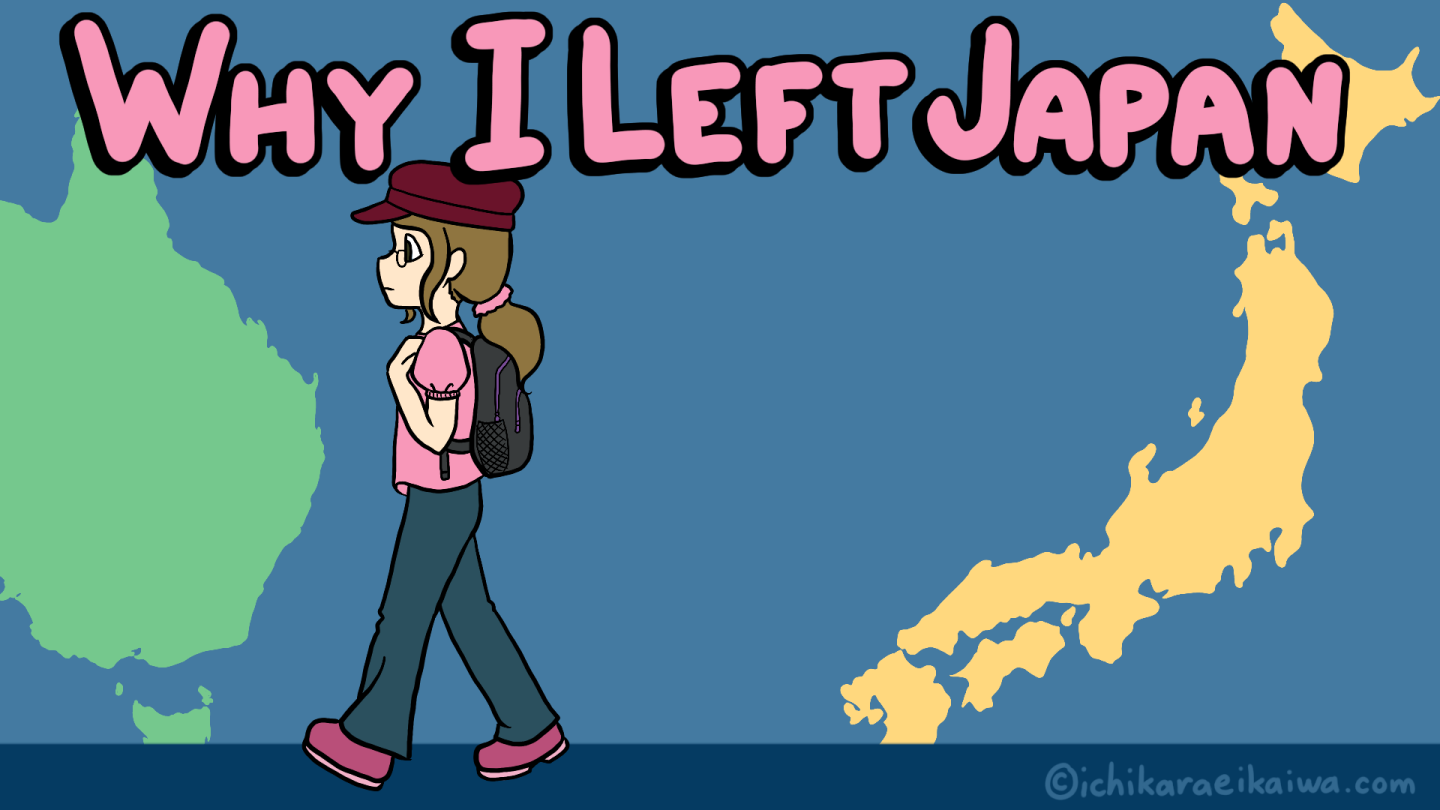【英語多読】Why I left Japan ~一生住む予定だった私が日本を離れた理由~

どうもどうも、いちから英会話のヒカリノです。
何回か記事の前置きで触れたと思いますが、今年の5月に私は8年間住んでいた日本を離れて母国のオーストラリアへ帰国しました。
帰国はコロナ関係ではなく、2年前から計画していたことで、私の中でとても大きな決断でした。
私は14歳の時からずっと日本で働きたくて、本当は一生住むつもりで日本に移住しました。それなのに今オーストラリアに帰国しています。
明日いっぱいで今年が終わりますし、最後はちょっと振り返って、自分の話をさせて頂こうと思います。
そんな訳で、今週の英語記事では、私が帰国した理由について書きました。400語近くの、かなり長めの記事になりましたが、日本のどんな所が外国人にとって住みづらいか知りたかったら、是非読んでみてください。1回記事を読んでみて自分の力で意味を推測してから、下のボックスを開き、理解を深めていきましょう。
When I moved to Japan in 2012, I planned to live there for the rest of my life. However, this year, I left Japan and returned to Australia. I decided to go home for many different reasons, but there were several main ones.
The biggest reason was that I didn’t like the Japanese work culture. For one thing, it’s normal for people in Japan to shout at their employees when they make a mistake. This is not okay in Australia, so it was very stressful for me. For another, people have to work too hard in Japan. For example, they often must work on their days off and stay at work until late. When I spent time with friends, they often said things like “Today is my first day off in forty days” or “I have to work sixteen days in a row next week.” To them, it was normal, but this style of working should not be normal.
I was also tired of being treated differently just because I was not Japanese. Even though I can speak Japanese fluently, people always treated me strangely. Many Japanese people used lots of katakana English words when they spoke to me, and it was difficult to understand. Co-workers spoke to me like I was a child. Shop assistants panicked when they saw me. Some people repeated my Japanese and laughed. Eventually, I became afraid of speaking to Japanese people who I didn’t know.
Finally, I want to have children in the future. My partner is Japanese, so if we have children in Japan, they will be called “haafu,” and they will be treated differently. I want my children to be children. I also want them to have a good education. At Japanese schools, students are not taught how to think. In addition, students are too tired to learn and stressed because they have to stay at school for a long time to do club activities. I don’t want my children to grow up in that kind of environment.
I love Japan, and helping Japanese people to learn English was my dream, but in the end, I decided to come home. Sometimes I feel sad because I enjoyed teaching English, but I’m glad that I made the decision.
単語の意味
the rest of my life – 生涯、一生
normal – 普通、正常
employee – 被雇用者、雇われ人
stressful – ストレスの多い
day off – 休日
in a row – 連続で
treat differently – 他と違う扱い方をする
fluently – ペラペラ、流暢に
treat ~ as – ~として扱う
strangely – 変なように、変かのように、変わっているように
co-worker – 同僚
shop assistants – 店員
panic – パニックする
repeat – 繰り返して言う
eventually – やがて
education – 教育
too ~ to V – Vするのに~過ぎる
stressed – ストレスがたまった
grow up – 育つ
environment – 環境
in the end – 最終的に
make a decision – 決断をする
日本語で内容理解をチェック!
この記事の内容にもっとも当てはまる物を以下の4つのうちから1つ選んでください。
ヒカリノが帰国した理由として挙げていないものは・・・
A) 日本人の働き方
B) 日本語の難しさ
C) 日本人からの扱い方
D) 日本の子育て環境
英語で必要な情報を探す練習、スキャニング!
- When did Hikarino start living in Japan?
- What did many Japanese people do when they spoke to Hikarino?
- Why doesn’t Hikarino want her children to go to school in Japan?
和訳
2012年に日本に引っ越した時、私は一生日本に住む予定でした。しかし、今年日本を離れてオーストラリアに帰りました。帰ることを決心したのは、色んな理由がありますが、いくつか主な理由がありました。
一番大きな理由は日本の働く文化が好きじゃなかったことです。まず、日本人にとって、雇っている人が間違いをした時に怒鳴ることが正常です。オーストラリアでは、これはしてはいけないので、私にとってとてもストレスになりました。それに、日本で人々はあまりにも一生懸命に働かなきゃいけません。例えば、よく休みの日に働いたり、遅くまで働いたりしなきゃいけません。友達と時間を過ごす時、「今日は40日ぶりの休みだ」や「来週は16連勤だ」のような事をよく言っていました。彼らにとっては普通でしたけど、こんな働き方が正常であるべきではありません。
日本人じゃないからと言って他の人と違う扱い方をされることにも疲れていました。日本語が流暢に喋れるのに、いつも日本人に変な扱いをされました。たくさんの日本人は私と喋る時に余計にカタカナ英語を使って、分かりにくかったです。同僚は私に対して子供にするような話し方をしました。店員が私を見るとパニックになりました。私の日本語を繰り返して笑う人もいました。やがて、知らない日本人と話すことが怖くなりました。
最後に、私は将来子供を産みたいです。私のパートナーは日本人なので、日本で子供を産んだ場合、その子供はハーフと呼ばれて、他の人と違う扱いをされます。私の子供に子供いてほしいです。また、良い教育を受けてほしいです。日本の学校では、学生は考え方を教わりません。それに、部活をするために長時間学校にいなきゃいけないため、ストレスがたまり、勉強するには疲れすぎています。私の子供にそんな環境で育ってほしくないです。
日本は大好きで、日本人の英語の勉強を手助けすることが夢でしたが、最終的に、帰国することにしました。英語を教えるのは楽しかったので、悲しくなる時がありますが、帰国を決心して良かったと思っています。
答え
内容理解チェック →
B) 日本語の難しさ
スキャニング →
When did Hikarino start living in Japan?
[She started living in Japan] in 2012.
What did many Japanese people do when they spoke to Hikarino?
They used lots of katakana English words.
Why doesn’t Hikarino want her children to go to school in Japan?
Because students are not taught how to think.
Because students are too tired to learn and stressed because they have to stay at school for a long time to do club activities.
(どちらも◎)
いかがでしたか?
あまりポジティブな話ではないんですけど、これは8年間しっかり日本と向き合った私の思ったことですので、しっかり受け止めて頂けたら嬉しいです。
それでは、今週のライティング課題です。
Tell me about a big thing that you did in 2020.
コメント欄に英語でどうぞ書いてみてください!





